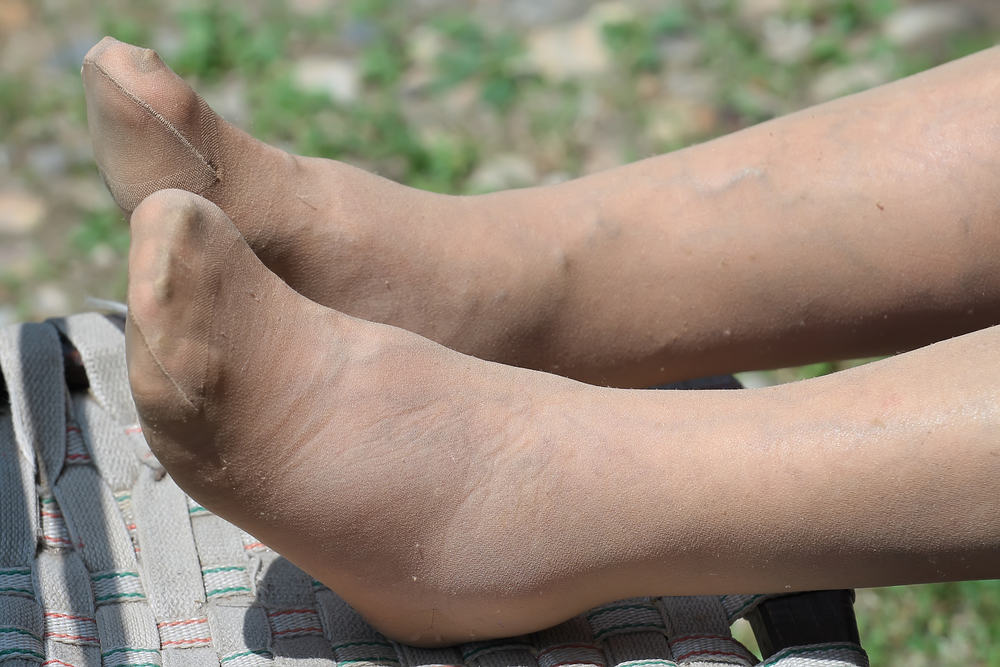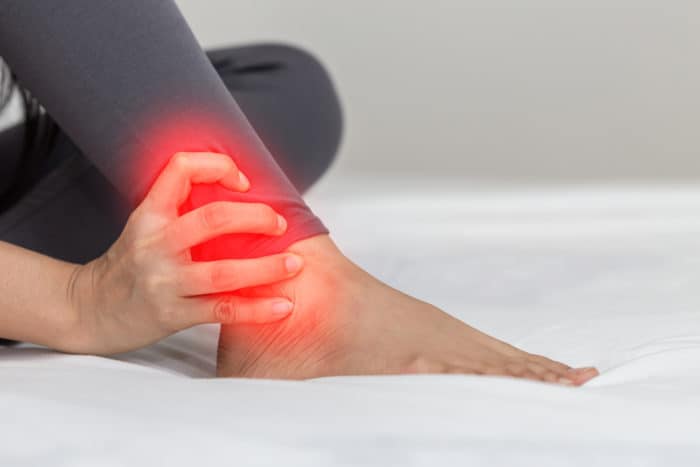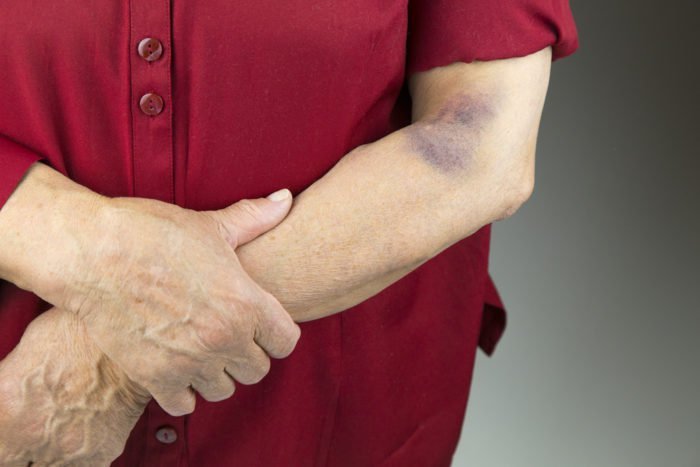Contents:
- Medical Video: How to Reduce Swelling in Legs, Feet and Ankles Quickly Due to Fluid Retention and Edema
- What are the causes of swollen feet?
- 1. Pregnancy
- 2. Injury
- 3. Peripheral edema
- 4. Infection
- 5. Venous insufficiency
- 6. Blood clots
- 7. Heart or heart disease
- 8. Ages that are no longer young
- 9. Pericarditis
- Other causes of swollen feet
- What are the signs of swollen feet?
- How do you deal with swollen feet?
- Treatment at home can be done
- Use compression stockings or socks to deal with swollen feet
- When do you need to use compression stockings?
Medical Video: How to Reduce Swelling in Legs, Feet and Ankles Quickly Due to Fluid Retention and Edema
The cause of swollen feet can be caused by various things. The conditions that are usually experienced by pregnant women can make you uncomfortable and can also limit your movements. Generally, the cause of normal swollen feet is triggered by injury or fluid buildup. Even worse, the condition of swollen feet coupled with other symptoms can also be a sign of an illness. Yes, many things can be the cause of swollen feet. Anything? Then, how to overcome it?
What are the causes of swollen feet?
Swollen feet can be caused by various things, from mild things to more serious things, such as serious illnesses. Some things that can be the cause of swollen feet are:
1. Pregnancy
Normal swollen feet occur in pregnant women because of changes in the body. However, it will be abnormal if swelling occurs suddenly or excessively. This can be a sign of preeclampsia, usually developing after 20 weeks' gestation.
2. Injury
Foot or ankle injuries that usually occur because you misstep can also cause swollen feet. Missteps can cause the ligaments in your legs to shift or sprain, causing the feet to swell. You can compress these swollen feet with ice to reduce swelling.
3. Peripheral edema
Swollen feet can occur due to peripheral edema, where fluid in the blood comes out of the capillaries and accumulates in the tissues. This can be caused by being overweight, standing too long in one place, sitting too long in one place (for example when in a car or plane), warm weather, or you are menstruating.
4. Infection
Infection can also be a cause of swollen feet. Usually this happens to people with diabetic neuropathy, where the nerves (especially in the legs) have been disrupted. Legs of people with diabetic neuropathy are not sensitive to any sensation, so foot infections are more likely to occur.
5. Venous insufficiency
Venous insufficiency is a condition in which blood is unable to move up from the leg blood vessels back to the heart. This is because the vein valve is disrupted or weakened.
As a result, blood returns to the lower part of the body and there is a buildup of fluid in the lower leg. This can cause skin changes, ulcers, and infections.
6. Blood clots
The presence of blood clots or blood clots in the legs can inhibit blood flow from the legs back to the heart, which can cause swollen feet. It is recommended that you see your doctor if you experience swelling in one leg accompanied by pain, fever, and possibly discoloration of the skin of the foot.
7. Heart or heart disease
Swollen feet can also be a sign that you are experiencing problems with the heart, liver, or kidneys. Heart failure can cause salt buildup and fluid on your feet. Liver disease can also reduce the production of protein albumin (which keeps the blood from leaking out of the blood vessels) and causes fluid leakage.
Kidney disease can also cause fluid buildup in the body because the kidneys are not functioning properly. It's best to check yourself if swollen feet are accompanied by loss of appetite, decreased body weight, and fatigue.
8. Ages that are no longer young
As we get older, the body is no longer able to produce collagen in large quantities. In fact, collagen is a special protein that is responsible for maintaining the elasticity and elasticity of the skin and preventing it bone loss. Collagen also functions to maintain the health of your joints. Body fat levels also decrease as you get older.
These various aging processes then cause various problems and diseases in the foot.
9. Pericarditis
Pericarditis is a long-term inflammation of the pericardium which is a membrane like a bag around the heart. This condition causes difficulty breathing and chronic and severe swelling in the legs and ankles.
Other causes of swollen feet
There are many causes for swollen feet. Areas that experience swelling can also spread to the wrists and soles of the feet. In most cases, the cause of swollen feet is related to certain lifestyle factors, such as:
- Overweight (overweight). Being overweight can reduce blood circulation, causing fluid buildup in the legs, wrists and soles of the feet.
- Activity that is too long. Standing or sitting for a long time makes the legs unable to pump body fluids back to the heart because the muscles are not active at that time.
The cause of swollen feet can also be due to factors using certain drugs. Some medications that can be the cause of swollen feet include:
- Steroids
- Estrogen or testosterone
- Some antidepressants
- Non-steroidal anti-inflammatory drugs (NSAIDs) are included ibuprofen, naproxen, celecoxib, and aspirin
- Heart disease drugs such as amplodipine and difedipine
- Some diabetes medications include metformin
In addition, these types of drugs can reduce blood circulation by increasing blood viscosity. Well, this is the cause of swollen feet.
Be sure to consult a doctor if you suspect that your medication causes swelling in the lower extremities. Do not stop using the drug before you consult a doctor first.
The condition of lymphadema can also be the cause of other swollen feet. Lymphedema, known as lymphatic obstruction, lymphedema causes a blockage in the lymphatic system.
This system consists of lymph nodes and blood vessels that help carry fluids throughout the body. Blockages in the lymphatic system cause the tissue to become swollen by fluid, resulting in swelling in the arms and legs.
What are the signs of swollen feet?
Swollen feet may be a common condition and need not worry. However, swollen feet can be a sign of danger and need to be addressed immediately by a doctor if:
- You have heart or kidney disease and experience swelling
- You have liver disease and have swelling in your legs
- The area is swollen red and feels warm to the touch
- Your body temperature is higher than normal
- You are pregnant and experience sudden or severe swelling
- You have tried treatment at home, but it didn't work
- Your swelling is getting worse
In some cases, your symptoms can get worse, such as:
- Pain, pressure, or tightness in the chest area
- Dizzy
- Daze
- Feel dizzy or faint
- Difficulty breathing or shortness of breath
There may be signs and symptoms not mentioned above. If you have concerns about certain symptoms, consult your doctor.
How do you deal with swollen feet?
Swollen feet are a very common health condition. This condition can afflict patients at any age. However, you can prevent it by reducing existing risk factors. Some things you can do to deal with swollen feet, namely:
- Rest your feet in a higher place. This can also reduce swelling. You can put a high pillow when you sleep or rest your feet on the wall.
- Soak the feet with epsom salt. Soaking the feet with cold water that has been mixed with epsom salt for 15-20 minutes can reduce swelling in the feet.
- Limit salt intake. Limiting salt intake to only one teaspoon per liver can help reduce fluid buildup in the legs.
- Regular exercise. Exercise can improve your blood circulation, so it can prevent you from swollen feet. Conversely, sitting or standing in one place for a long time can increase the risk of swollen feet. Movement of your feet every few minutes when sitting or standing for a long time.
- Lose weight. Losing weight can reduce swelling in the legs and make you healthier.
If you have already done this, but the swelling in your legs has not diminished too, you should see a doctor. This may be caused by a serious problem, such as heart disease, kidney, liver, or side effects from the drug, which need to be treated by a doctor.
If your swelling is related to lifestyle habits or minor injuries, your doctor will likely give you swollen foot medication that can be done at home. The medicine for swollen feet can begin with resting, improving food intake, and so on.
If your swelling is a result of another underlying health condition, the doctor will first try to treat the specific condition.
Swelling can be reduced by prescription drugs, such as diuretics. However, this swollen foot medication using a prescription can cause side effects, and is usually only used if treatment at home is not successful.
In serious cases, your doctor may perform surgery to deal with the swelling that you are experiencing.
Treatment at home can be done
There are several ways to deal with swollen feet in the house including:
- Raise your feet whenever you lie down. The foot must be raised so that it is higher than the heart. You might want to put a pillow under your feet to make it more comfortable.
- Stay active and focus on stretching and moving your legs.
- Reduce your salt intake, which can reduce the amount of fluid that can accumulate in the legs.
- Avoid wearing garters and other types of tight clothing around your thighs.
- If you are overweight or obese, try to lose the ideal weight according to your height.
- Wear compression stockings or socks.
- Stand or walk at least once every hour, especially if you remain seated or standing for a long time.
- If the cause of your swollen feet is due to the side effects of using certain drugs, you should immediately consult a doctor. Never stop, reduce, or add a dose of medicine without the doctor's permission. The doctor will provide a choice of other drugs that are suitable for your condition.
Use compression stockings or socks to deal with swollen feet
Compression stocking is a type of elastic socks designed specifically to press your feet. The goal is to create smooth blood circulation. Compression stocking is tighter on the legs, then gradually loosens up to the calves.
Pressure on the feet and ankles helps blood vessels to pump blood so that more blood can return to the heart and only a little blood stasis in the legs and calves.
Therefore, compression stockings will not only reduce swelling and pain in your feet, but can also help prevent serious conditions such as blood clots.
When do you need to use compression stockings?
Compression socks are usually recommended by doctors if the blood circulation in the legs is disrupted and causes the feet to swell. Generally caused by blood vessel related problems. If your feet feel heavy at night or you experience swelling or pain, it is very important to see a doctor to find the main cause of this problem.
Next, the doctor will determine whether you need to use compression stockings or not. The use of compression stockings is usually needed in the following conditions of swollen feet:
- Chronic venous insufficiency. This condition occurs when the valve in your vein is damaged so it cannot pump blood to the heart properly.
- Deep vein thrombosis (deep vein thrombosis or DVT).
- Varicose veins, that is, the vein enlarges due to valvular disorders or the weakness of blood vessel walls. Due to the enlarged diameter, normal pressure is not enough to pump blood to return to the heart.
- Spider veins. Although not as heavy as varicose veins, unfortunately this condition can develop into varicose veins. Compression therapy can stop this process or at least slow it down.
- Pregnancy. Foot veins are always affected during pregnancy. Often times pregnant women experience swelling of the legs because the enlarged uterus presses against the blood vessels and the hormones that dilate blood vessels.
- "Economy class syndrome". This syndrome is named as this is related to the limited movement of your feet on long-haul flights or long trips by train or car. When blood flow stasis, it is easier to have blood clots that can have serious consequences if the clot goes to the lungs or heart.



















